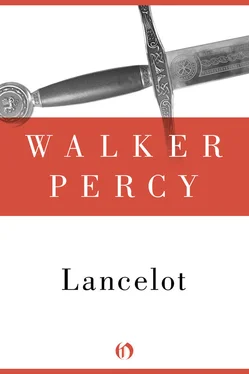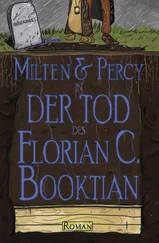You look so unhappy. Who are you unhappy for? Me? Lily? My father? Sinful suffering humanity? Your own sunk melancholy family? Are you playing the priest now?
Elgin? Yes, you’re right. It was Elgin I was talking about. Yes. No. Wait. I did mention a map. It wasn’t a map. It was a floor plan. I remember. I gave Elgin the floor plan of the Holiday Inn which I had gotten that very afternoon from my Uncle Lock. Bushrod Laughlin Lamar, who operated it.
“Elgin, here is a floor plan of the Holiday Inn.”
“Yes, sir.” He took it. It could have been his pay check for all the reaction he showed. Does anything white people do ever surprise blacks?
“Here’s a problem where you might be able to help me. You don’t need to know the details. It is enough to say that I am concerned about my daughter Lucy, who is young and impressionable and may have gotten into some difficulties with drugs. But first I have to have the facts, beginning with where she goes, how she spends her time.”
Elgin squinted hard at the floor plan as if he expected to see Lucy.
“What I want you to do is this. I want you to register at the Holiday Inn for the next three nights and keep a log of her comings and goings. You know, the film crew is there, and she’s stagestruck and hangs around at all hours. In fact, make a complete record. Make a note of anyone you know: Merlin, Troy Dana, Janos Jacoby, Raine Robinette, even me and my wife. I want the whole picture. Do you understand?”
His single swift opaque look told me he did understand. Understood and agreed. Understood even that there was something I needed to know but didn’t want to tell him, nor did he want me to.
“Now here’s the problem. Think of it as a mathematical game. I want you to pick one of those rooms. I’ve fixed it up with Lock, you can have any room you want, he knows you’re in the film.”
Placing the floor plan on the plantation desk between us, I wrote names in empty rooms.
“The idea is to pick a room or any other vantage point which commands a view of the following: the inner door of the Oleander Room here — that’s where they view the rushes — Dana’s room here, Raine’s here, Merlin’s here, Jacoby’s here. Here’s the hitch (this should interest you — it baffles me): there would be no problem if the inner court were a simple quadrangle. You could simply sit at the window of nearly every room and see everything, even Merlin’s room, which is on the second story. All you would have to do is choose a room, say here on the first floor opposite. But as you see, it is not so simple. The court is L-shaped. So if you took this room, you could not see Raine’s room here. And if you took this room, you could see Raine’s room but not Merlin’s.”
“Mm.” Now Elgin was interested, transported from the inelegant mysteries of white folks’ doings to the elegant simplicities of geometry. Using his thumb, he began to push his lip over his eyetooth, a new mannerism. My guess is he got it from one of his M.I.T. professors.
“Take these binoculars, Elgin. They are excellent night glasses. Don’t forget your log. In your log make a note of everything you see: not only the exact time anyone enters or leaves a room, but anything else you happen to notice, what a person may carry with him, what they do, the smallest item of behavior.”
Elgin was busy drawing lines across the court, angles and declinations. He frowned happily. I repeated my instructions.
“You mean all night?”
“Yes. That is, from eleven to dawn. Or rather, just before dawn. I don’t want you to be seen.”
“For three nights?”
“Maybe. At the outside. We’ll see how it goes. You’re relieved as of now from guide duty. Go home and get some sleep. I’ll tell Ellis that I’m sending you to New Orleans to take a deposition.”
“I wonder what this room is. Probably the alcove for Coke machine and ice maker.”
“Probably. No window.”
Elgin took off his glasses and rubbed his eyes. “You see, here’s what it comes to.” I could see him twenty years later, for his expression, his mannerisms had already begun to set; see him behind his desk, give himself to a problem, quickly take off his glasses and rub his eyes. “The problem as you pose it is insoluble — unless you want to rig up a system of mirrors, bore holes in floors, which I gather you don’t.”
“I don’t.”
“You see, if I were in 214, an upper room near the inner corner of the ell, I could see every room but Raine’s on the first floor. On the other hand, if I were across the court near the outer corner of the ell, I couldn’t see Merlin’s room.” More lines, lines crossing lines like electrons colliding.
“To see all rooms, posing the problem as you do, you’d need two observers. Me here and, say, Fluker here.”
“Fluker! He’d go to sleep!”
We both laughed. The very name was funny for us, a secret joke.
Elgin smiled his old smile, his sweet white-flashing un-mannered smile. “He sho would. Hm. Let’s see. Let’s-us-see.” He gazed at the plan and tapped his pencil. Why did I feel like the student visiting the professor? “We-ull!” (How happy scientists are! Why didn’t we become scientists, Percival? They confront problems which can be solved. We don’t know what we confront. Does it have a name?)
Elgin put on his glasses. “The pool is here?”
“Right.”
“Is it lit?”
“By underwater lights after ten. The floodlights are fixed to the balconies but the area around the pool is fairly dark.”
“Lounges and chairs around here?”
“Yes.”
“Scrubs — that is, shrubbery around here?”
“Yes.” Ellis, his father, used to say scrubs for shrubs : “You want me to cut them scrubs?” Not even Ellis says that any more.
“Then there’s only one place.” Elgin dropped his pencil with a clatter, picked it up. made a big X, dropped it again, sat back. He smiled. His eyelids lowered. He’d made a breakthrough!
“The middle of the court?”
“Sure. Where else?”
“But—”
“What kind of lounge chairs they got?”
“What kind?”
“I mean light aluminum or those heavy wooden ones?”
“Redwood, heavy, black webbing. Too heavy to steal, I remember. Lock is proud of them.”
Again Elgin smiled his old brilliant sweet smile. In his triumph he permitted himself to be what he was: a twenty-two-year-old Southern youth who smiled and laughed a great deal. “It’s dark here you say. The lounges are dark, the webbing is black. I’ll wear black swim trunks and man can’t nobody see nothing.”
I smiled. He wasn’t even burlesquing himself as black or Southern black but as TV-Hollywood-Sammy-Davis-Junior black and he knew that I knew it.
He snapped his fingers. “No. It’s even better than that.”
“How?”
“Don’t you see? It wouldn’t matter if anyone saw me at that distance. A man in trunks by the pool. Nobody would pay the slightest attention. Like Poe’s Purloined Letter .”
Poe’s Purloined Letter. I thought about J. B. Jenkins, bad man, good man, bad good man, Kluxer, Christian, tackle, and comrade at arms against Alabama’s mighty Crimson Tide. The only Poe he knew was Alcide “Coonass” Poe, tailback from De Ridder. J. B. and I, sunk in life, soaked in old Louisiana blood and tears and three hundred years of Christian sin and broadsword Bowie-knife Sharps-rifle bloodshed and victory-defeat. And Elgin leapfrogging us all, transformed overnight into snotty-cool Yankee professor.
Poe’s Purloined Letter indeed. Poe. He too had got onto Elgin’s secret: Find happiness in problems and puzzles and mathematical gold bugs. But he let go of it. Went nutty like me. Elgin wouldn’t.
Читать дальше












